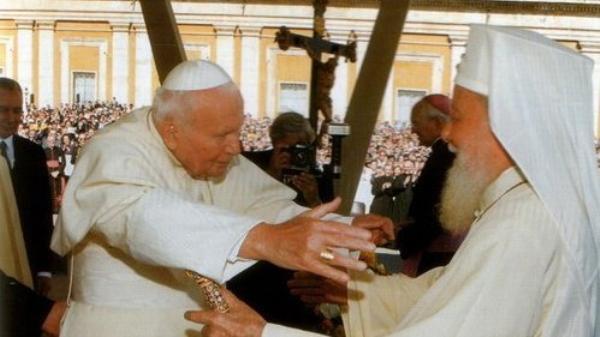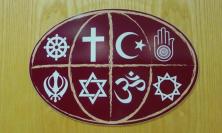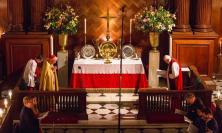Today is the start of the Week of Prayer for Christian Unity. Renowned Irish ecumenist, Michael Hurley SJ, traces the ups and downs of the last hundred years and asks where our once great hopes lie today.
Just ten years ago, in 1998, in the
course of a paper read at a meeting in Heythrop College, London, I made
bold to say:
The forthcoming
millennium, as I envisage it, will bring to an end the present cold winter of
ecumenical apathy and inertia and in its place usher in a warm spring of
ecumenical hope which will give the ship of the Church a new sense of
direction, new vision and energy and enable the movement for Christian
unity to gather momentum and speed once more.
But I would want immediately to quote Newman's description of spring in
his famous sermon of that title at the First Synod of the new English Catholic
Hierarchy at Oscott on 13 July 1852.
Newman thought of spring not as a halcyon period of great calm but as
'an uncertain, anxious time of hope and fear, of joy and suffering, of bright
promise and budding hopes, yet withal, of keen blasts, and cold showers, and
sudden storms'. (One in Christ 1999/3 p 200)
Though subdued by the Newman
quotation, the tone here is upbeat and in retrospect not surprisingly. The occasion was a hopeful one: a meeting
of the Association of Interchurch Families (AIF) which has given so much
hope to so many people; a meeting called specially to honour the fond memory
of Fr John Coventry SJ whom the Association reveres as its founder
and who also gave hope to many, not least to us in Ireland. In the 70s, in those dark days in the
history of these islands, when British-Irish cooperation, even among Jesuits,
was not yet the in-thing it has now happily become, John very bravely and very
generously travelled across regularly, bringing hope to North as well as South
and to the infant Irish School of Ecumenics.
And this 1998 AIF meeting was taking place in the context of the
forthcoming new millennium when hopes were high not only in general but in
relation to ecumenism in particular. My Heythrop paper was entitled 'The
New Millennium: an Ecumenical Second Spring?'
Ten years later the occasion for these
ecumenical reflections is the January 2008 Week of Prayer for Christian
Unity. We are scarcely a decade into this 'new', third millennium and the
mills of the Church, like those of God, do grind slowly. But are ecumenical hopes still
high? What is the mood of the movement
for the 21st century, for the foreseeable future, for 2008?
Centenary of January Week of Prayer for Christian Unity
To begin with, it may be hopeful to
recall that 2008 marks the centenary of this January Week of Prayer. Originally called an 'octave' it was an
initiative of the American Anglican (Episcopal) priest, Lewis Thomas
Wattson. In those days post-Reformation concerns still dominated the
Churches' horizons: each was concerned to identify itself over against the others
as the one true Church in which personal salvation was to be found. But
Wattson came to appreciate the place of the Papacy as an essential and he
established a religious congregation, the Society of the Atonement, to pray and
work for 'at-one-ment', for corporate reunion with the Roman Catholic
Church; the Octave he conceived as a means to that end.
Happily in the course of the 20th
century the Churches' self-understanding changed: it became ecumenical. Their missionary work overseas developed and
they came to see their very multiplicity as an obstacle, as a scandal
leading to confusion, disbelief and indifference; they became convinced that
Christian unity is God's will and his gift 'so that the world may
believe'. And it is in that spirit that we now celebrate the January
Unity Week. None of the Churches any longer prays that the
others will 'come over to us', corporately or individually; we pray rather
that all of us will come closer together to give more effective witness and to
help the world - not only overseas but here at home in Europe - to believe; to
help the post-modern world of unbelief within us and around us to lose its
grip, to decline. Together - for the
first time ever - what could we not do? What could we not do together to
promote peace and justice and also, if not above all, to hasten the
development here of the post-secular culture with its positive attitude to
religious belief and believers which is now emerging elsewhere? (Cf Post-secular
Philosophy, ed Phillip Bland, Routledge, London and New York 1998)
But this ecumenical approach, one of
the glorious achievements of the 20th century and surely one of the
fruits of the Churches' prayers, stands or falls on mutual trust, on a shared
understanding that none of us by ourselves alone constitute the one true
Church, that none of us want the others simply to change their church
allegiance, that what we all want is to help the world to believe. Unfortunately the Orthodox still
remain to be convinced. The scramble for Russia which followed the fall
of communism lead to an influx, an 'inroad' of non-Orthodox Churches and to the
impression that a crusade of proselytism was under way. In the Catholic Church, as a result, hopes
for unity with the Orthodox in any foreseeable future are not
high. If some of us are less concerned
about this, we would do well to remind ourselves that Christianity is an
Eastern, not a Western religion and that we ignore at our peril the
Christian East.
The Centenary of
Ne Temere
The memories which the year
1908 evokes include not only the happy memory of the first celebration of
the January Week of Prayer for Christian Unity but also the unhappy memory
of the promulgation that Easter, by Pope Pius X, of the Ne Temere
decree. Among other things this made it
obligatory that a 'mixed marriage' - a marriage between a Catholic and
Protestant - be celebrated in the Roman Catholic Church and that all the
children be brought up as Catholics.
The decree was anathema to Protestants and, paradoxically perhaps, opposition
to it here in Ireland was probably the first example of united action by all
the other Churches. For almost all my
life this has been a millstone around our ecumenical necks. Its theology
was pre-ecumenical and anti-ecumenical. It played a significant part in
weakening the Protestant population.
But happily the issue of 'mixed marriages' has now ceased to be the
major irritant it was for most of the 20th century; such marriages
have become a ground of hope. For this
we have to thank specially the Interchurch Family Associations. In
this new century 'mixed marriages' can play a promising, hopeful role in
the development of a post-secular culture.
Centenary of the 1908 Lambeth Conference
A third memory which 1908 evokes is
of that year's Lambeth Conference of Anglican bishops and its remarkable
statement about relations with Rome:
There can be no
fulfilment of the divine purpose in any scheme of reunion which does not
ultimately include the great Latin Church of the West, with whom our history
has been so closely associated in the past, and to which we are still
bound by very many ties of common faith and tradition.
This statement is remarkable for
many reasons, but for this in particular, that the two previous Lambeth
Conferences had been very angry with Rome: in 1897 because of Leo XIII's
negative decision about Anglican Orders and in 1888 because of Vatican I and
its Decree on Papal Primacy and Infallibility. In the meantime however, especially since Vatican II, much water
has flowed under the bridges of the Thames and the Tiber. What can we now hope for in the foreseeable
future?
One answer can be found in the 2007
document Growing Together in Unity and Mission. Building on 40 Years of
Anglican-Roman Catholic Dialogue.
It is 'An Agreed Statement of the International Anglican-Roman Catholic
Commission for Unity and Mission' ( IARCCUM).
Here is its background: (all the quotations which follow are from the
London: SPCK 2007 edition.)
Growing Together in Unity and Mission
In May 2000, as a
new millennium project, Archbishop Carey of Canterbury and Cardinal Cassidy of
the Pontifical Council for Promoting Christian Unity hosted a meeting of
bishops from both communions, 'to seek a way forward in the continuing
relationship between the Anglican Communion and the Catholic Church'(Preface). The meeting, which took place at Mississauga
in Canada, 'was filled with hope'. The
time had come, they felt, to inaugurate 'a new stage in our relations'. They
stated:
We
believe that now is the appropriate time for the authorities of our two
Communions to recognise and endorse this new stage through the signing of a
Joint Declaration of Agreement. (para 6)
They decided that a new body be established to inaugurate this 'new
stage' But
sadly by the time this new body, The
International Anglican-Roman Catholic Commission for Unity and Mission
(IARCUUM), came to meet they had to conclude that, because of the now
well-known difficulties within Anglicanism and the new differences these
created between our two Communions, 'this present context... is not the
appropriate time to enter the new formal stage of relationship envisaged by the
bishops at Mississauga.' 'Nevertheless,' they went on to state:
it must be
acknowledged that the progress towards agreement in faith achieved through the
theological dialogue has been substantial, but that in the past four decades we
have only just begun to give tangible expression to the incontrovertible
elements of shared faith. Even in a
time of uncertainty, the mission given us by Christ obliges and compels us to
seek to engage more deeply and widely in a partnership in mission, coupled with
common witness and joint prayer. (para 7)
Fruitfulness of Anglican Orders
But what, if anything, is hopeful
in the document which this new body, IARCUUM, produced last year, in
2007? It could appear at
first like a tired rehearsal of what has already been agreed and
suggested. However the document can be understood to contain a
significant message about the whole aim of the Anglican/Roman Catholic
dialogue. And in addition it includes
at least two points of detail which are of considerable interest and quite
challenging. The first of these is
found in paragraph 113 which reads as follows:
While not losing
sight of underlying doctrinal problems regarding the mutual recognition
of orders (cf. paragraphs 60 to 61 above), every appropriate opportunity
can be taken to acknowledge publicly the fruitfulness of each other's
ministries, for example by attending each other's ordinations.
But what does fruitfulness
mean? Any hopes we might have that it implies validity will be
disappointed. A Catholic theologian can
recognize (as, for instance, Fr Ted Yarnold SJ did) that a sacrament can be fruitful,
efficacious, although invalid. And in
the other Churches where the term 'invalidity' is no longer much used,
'fruitfulness' is clearly distinguished from 'mutual recognition of orders' (as
in paragraph 113 quoted above). Here in Ireland since 1974 our Anglicans
(the Church of Ireland) accept that Methodist and Presbyterian ordained
ministries are 'real and efficacious' - are fruitful, but it is only in very
recent years that they are in discussion with the Methodists - not however with
the Presbyterians - about moving forward to 'interchangeability of ministry',
to mutual recognition of ministry. Both Churches hope this might happen
from 2009 'on an experimental basis and only in experimental situations'.
However, despite its limitations, as
accepted by both Anglicans and Catholics, the concept of fruitfulness and its
application to Anglican orders in particular is refreshing and hopeful.
The Catholic Church holds Anglican orders to be 'absolutely null and
void'. It seems a contradiction to call
them 'fruitful'. But, on the other
hand, no one who has any experience of the life and work of Anglican
priests would ever question the value, the goodness, the spiritual reality, the
efficacy of their preaching ministry or of their pastoral ministry in general
within and outside their parishes. For
others this paragraph will come as a welcome reminder of the fact that in
the 90s, when former Church of England clergy were being ordained as Roman
Catholic priests, it was agreed that the liturgy might give explicit
recognition to and thanks for 'the value', 'the fruitfulness for salvation' of
their 'faithful ministry in the Church of England' (Cf The Tablet 30
April 1994, p 542; 20 April 1996 p 513). Indeed an affirmation of
fruitfulness seems little more than an application of what Vatican II's 'Decree
on Ecumenism' states in paragraph 3:
The separated
Churches and communities as such... have been by no means deprived of
significance and importance in the mystery of salvation. For the Spirit of Christ has not refrained
from using them as means of salvation.
But a reminder of the
'fruitfulness' of Anglican orders, even if it doesn't mean 'valid', does
give hope. It can surely help to make Catholic-Anglican relationships,
both individual and corporate, more religious, more spiritual, involving shared
prayer as well as shared work, less reflective of the post-modern culture which
still dominates, more reflective of the post-secular culture to which we
aspire. Could it not make Catholics more ready to recognize the holiness of the
ordained, more happy to ask Anglican priests for their prayers, for their
blessing, more generous in inviting them to officiate at prayer meetings, bible
study meetings and in general at non-eucharistic services?
Eucharistic Hospitality
Unfortunately these non-eucharistic
services can be sadly lacking in Catholic churches. Since Vatican II our services tend to be eucharistic in a rather
unbalanced way. And, Growing
Together in Unity and Mission, the 2007 Anglican/Catholic document
we are considering, is far from promoting a more relaxed discipline with
regard to eucharistic sharing.
Paragraph 101 reads as follows:
We encourage
attendance at each other's Eucharists, respecting the different disciplines of
our churches... While this would take the form of non-communicating attendance in
each other's churches, it would nonetheless initiate a renewed awareness of the
value of spiritual communion. We
commend the offering of a blessing which has become a regular practice in some
places for those who may not receive holy communion.
This acceptance of the present
Catholic discipline is a sobering but very challenging reminder that in the
West we may have exaggerated the role of the eucharist in promoting Christian
unity, if not indeed its whole place in church life. Perhaps we
have confused centrality and frequency? For many Protestants the eucharist is not really central,
and for those Christians who do hold it as central - the Orthodox for
instance and most Anglicans - centrality doesn't mean frequency.
When, as for instance at Catholic
funerals and weddings, attendance at a service is likely to be
'cross-community', can the now traditional inclusion of a eucharist not
be more embarrassing than helpful? It can be embarrassing not only for
the Anglicans and Protestants who are present and are not made welcome to
communion but also for the Catholics present who are no longer churchgoing and
for whom communion may not be appropriate.
Organic Unity?
'The restoration of full organic
unity' has been the clear aim of the Anglican/ Roman Catholic
International Commission (ARCIC) from its very beginning in 1967. The
principal means to that end has been the production of Agreed Statements on
doctrinal matters and the sharing of these insights with the Church membership
in general. In retrospect, however, the question can be asked
whether there has not been too much emphasis on this 'dialogue of truth', and
too little on the 'dialogue of love' - on 'doing everything together as far as
conscience permits' - which reconciliation also requires. Growing Together in Unity and
Mission, the 2007 document of IARCUUM, suggests as much when it
states that 'in the past four decades we have only just begun to give tangible
expression to the incontrovertible elements of shared faith'. Its message, clear if implicit, is that
organic unity, although still our aim, is not for now, not for the foreseeable
future, that it is aspirational, for some remote future. It is saying clearly if implicitly what the
Anglican-Roman Catholic Joint Preparatory Commission had already stated
explicitly in its Malta Report of 1968: 'the fulfilment of our aim is far from
imminent'. Without simultaneous progress on the practical as well as the theological level, 'the only
growing-together will be among delegates to theological conferences'.
So, according to Growing Together
in Unity and Mission, our aim now is not so much to anticipate the
end, the future, but to celebrate the given and so to hasten the end; to become
'partners', to cooperate in the whole gamut of Christian life and work, and
with a renewed interest in baptism: its joint preparation and celebration (para
100). Eventually, of course, our
ecological responsibilities may lead us to shared buildings as well as shared
faith. Otherwise the world of unbelief
in our parishes and dioceses and in our own very selves will only grow
stronger, and the emergence of a post-secular culture will be further
delayed. In 1981 The Final Report of ARCIC had:
'high
expectations that significant initiatives will be boldly undertaken to deepen
our reconciliation and lead us forward in the quest for the full communion to
which we have been committed, in obedience to God, from the beginning of our
dialogue.'
My own hope now would be that one of
these 'significant initiatives' might be the holding of services of mutual
forgiveness at various levels. This
would require 'boldness' as the Day of Pardon celebrated at the Vatican
in March 2000 certainly did. But it
would also help to liberate us from those negative religious feelings which our
postmodern culture doesn't encourage us to admit, much less to show, and which
are ecumenically so inhibiting. We
might follow the example of our Anglican and Catholic Bishops here in the
diocese of Ferns, in County Wexford. In
a joint letter in May 2000 they recalled how 'relationships between us as
churches have undergone a sea-change' and added:
Grateful as we
are for that flowering of ecumenical fellowship, goodwill and co-operation, we
cannot but feel called to ask God's and each other's forgiveness for the many
divisive, wounding and unChristian attitudes, policies and practices that found
their way into both our churches during the centuries since the
Reformation. We each express true repentance on behalf of our own church
for these hurtful and damaging words and deeds, and we pray that the
reconciliation all of us in both churches seek may be brought nearer by our
request for forgiveness and our expression of true conversion of heart in
relation to these ecumenical faults and failings. 
Michael Hurley,
an Irish Jesuit, is the founder of the Irish School of Ecumenics, and the
author of "Healing and Hope: Memories of an Irish Ecumenist".
![]() Irish School of Ecumenics
Irish School of Ecumenics
![]() Healing and Hope: Memories of an Irish Ecumenist
Healing and Hope: Memories of an Irish Ecumenist






